-
North AmericanNorth American

Association of Sales Engineers
Association of Sales Engineers
Menu
North American Association of Sales Engineers
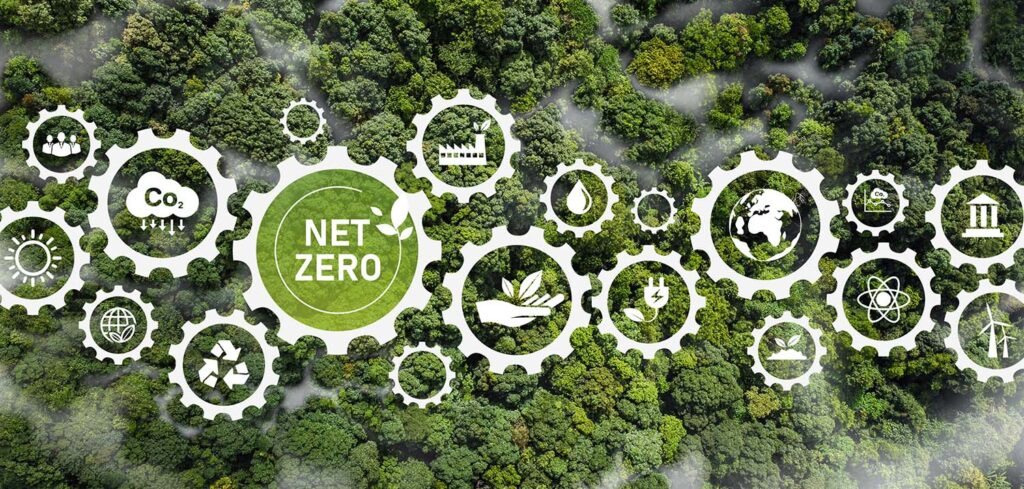
In today’s world, where environmental concerns are becoming increasingly pressing, sustainability in sales engineering has emerged as a crucial focus. Integrating eco-friendly practices into sales engineering not only helps in mitigating environmental impact but also enhances business efficiency, reduces costs, and improves brand reputation. This article explores various sustainable practices in sales engineering and their significance.
Sustainable sales engineering focuses on designing and implementing processes that minimize waste, maximize efficiency, and enhance sales activities. A key aspect of this approach is waste reduction and recycling, achieved by designing products for easy disassembly and recycling. This extends the product lifecycle, reduces the overall environmental footprint, and appeals to environmentally conscious customers.
Although sales engineers are not directly involved in product engineering, design, and manufacturing, they play a critical role as stewards of their companies’ portfolios. Their responsibility is to present and market the results of these areas to customers. By advocating for sustainably engineered products focused on minimizing environmental impact, sales engineers can gain advantages in closing deals and enhancing profitability.
Sales engineers do more than just offer products; they can work consultatively to suggest different manufacturing processes or supply tailored products to meet specific needs. Efficient manufacturing processes can enhance sustainability while saving energy and resources.
Sales engineers can leverage sustainability metrics and Life Cycle Assessment (LCA) to evaluate the environmental impact of products from raw material extraction to disposal. These assessments provide valuable data that can be used in sales pitches to highlight the eco-friendliness of products, attracting customers who prioritize sustainability. Additionally, these metrics allow sales teams to tailor their strategies to emphasize the long-term cost savings and environmental benefits of their products.
Moreover, adopting sustainable practices within sales operations, such as using digital tools to reduce paper usage and optimizing logistics to minimize fuel consumption, can further enhance efficiency and reduce costs. By integrating sustainability into sales strategies, companies contribute to environmental preservation and differentiate themselves in the marketplace. This builds a strong, eco-friendly brand image that resonates with today’s conscientious consumers.
Incorporating sustainable practices into sales engineering improves operational efficiency and positions the company as a leader in sustainability. This not only enhances brand reputation but also drives sales growth through a commitment to eco-friendly solutions.
Integrating sustainable practices in sales engineering is not just an ethical choice but a strategic imperative. By adopting eco-friendly practices, businesses can reduce their environmental impact, lower operational costs, and build a positive brand image. As the world faces unprecedented environmental challenges, the role of sustainable practices in sales engineering becomes ever more critical. Businesses that lead in sustainability will not only contribute to environmental preservation but also position themselves at the forefront of the global sustainability movement.
Thanks to the author of this article(Mentioned below).
CSe. Marcelo Miranda Santos
Production Engineer, Sales Manager and Certified Sales Engineer
In 2024, businesses just need to have their presence online and join hands with technology for their operations. In fact, organizations of all sizes rely profoundly on computerized systems and online platforms for their daily operations.
Cybercriminals are employing sophisticated techniques at an alarming rate to compromise networks and steal sensitive data. Reports published by Comptia Community suggest that cyber-attacks rose significantly in the last few days, affecting more than 2200 organizations and individuals every day.
Below we talk about all the essential cybersecurity technologies that you must consider implying to protect your business for all online attacks. Take a look.
Artificial intelligence (AI) and machine learning (ML) have become indispensable for modern cybersecurity solutions. At their core, AI and ML make computers smarter at detecting patterns in huge volumes of data. When applied to cybersecurity, they can significantly boost threat detection and prevention capabilities. Key factors like easy implementation and automation have prompted to incorporate AI into Business operations and therefore even small to mid-sized businesses are investing in AI-powered cybersecurity tools like next-gen antivirus, endpoint detection, etc.
How AI/ML Help:
The growing interconnection between devices through IoT provides operational benefits but also expands the attack surface. As per reports published by GSMA, over 25 billion devices will be connected to the internet by 2025, each needing protection from exploits. Businesses can consult with a reputed IoT Development Company and implement a defined-in-depth strategy balancing safety, accessibility and reliability needs.
Fundamentals of IoT Security:
Cloud adoption has benefited entrepreneurs and enterprises of all sizes with agility, scalability and economic factors. However, it has also increased the attack surface if not implemented securely.
Important Aspects of Cloud Security:
Blockchain has emerged as a highly secure and trusted technology suitable for many use-cases beyond cryptocurrencies. Its key attributes of decentralization, transparency and immutability make it an ideal option for building trust networks without reliance on central authorities.
Some use-cases for blockchain in security:
Malicious insiders, careless users, targeted attacks or technical errors can all potentially lead to unauthorized data breaches if not checked. This is where Data Loss Prevention (DLP) technologies become important to define controls and monitor data flows.
Key facets of an effective DLP strategy:
As technology accelerates digital transformations, cyber risks diversify in scope and impact. Adopting a proactive, adaptive and intelligence-led security posture underpinned by prominent technologies equips organizations to assure continuous service delivery, safeguard crown jewels and build trust with stakeholders. Good luck!
Special thanks to the author of this article Harikrishna Kundariya

Strong brand perception is crucial for business success. A positive brand image attracts top talent, fosters trust with customers, and opens doors to new opportunities. Sales engineers are pivotal in enhancing this perception through their in-depth understanding of customer needs. By combining their sales skills with technical expertise, they deliver tailored customer experiences that reinforce the brand’s credibility.
In this article, we’ll take a closer look at the different ways sales engineers can reinforce a brand’s credibility, helping them maintain a positive image:
Sales engineers have the power to build the product and brand’s image by actively promoting different innovations. One way sales engineers can champion innovation is to move past simply announcing innovations and become vocal advocates instead. It’s best if they start explaining the “why” behind the new product or service. This showcases the technical feat while understanding customer needs and market trends.
Sales engineers can also explain how innovation solves real-world problems or improves customer lives. This positions the brand as innovative, socially responsible, and impactful.
Sales engineers often deal with complex technical concepts. Effective communication allows them to translate these ideas into clear, concise language that resonates with a broader audience. When sales engineers effectively communicate the brand’s technical capabilities and achievements, it builds trust and credibility with the audience.
There are different effective communication strategies for sales engineers. Sales engineers must always remember to tailor the message to the audience. Use clear, concise language for the target audience. They should also avoid overly technical jargon and explain complex concepts easily.
In addition, they could also utilize various communication channels to reach their audience. This could include blog posts, articles, social media, press releases, or even video presentations.
Nowadays, user reviews and online recommendations are incredibly influential. Focusing on user experience (UX) will help sales engineers promote products that users love and promote online. This emphasis on UX enhances brand perception and boosts customer experiences with expert solutions.
An iterative design ensures you drive customer experience into product strategy. As such, sales engineers must embrace an iterative design process. It’s important to continuously gather user feedback and refine the product based on their needs.
Usability testing is also important when it comes to creating products. Sales engineers must identify any potential roadblocks or frustrations users might encounter when interacting with the product. This allows them to address these issues and guarantees a smooth and intuitive experience.
Humanizing paves the way for better connections. People connect with people. Brands that showcase the human faces behind the technology can foster a better sense of connection with the audience.
Sales engineers can offer glimpses into the production process through blog posts, videos, or social media stories, which is a great way to humanize a brand. Audiences can connect with the people behind the innovation when they see professionals brainstorming ideas, working on prototypes, or even celebrating successes.
A one-sided approach won’t work in today’s market. Effective brand awareness is built on a unified message, and that’s where cross-functional collaboration comes in. Sales engineers should work closely with marketing and sales teams to understand market trends and customer needs. This collaboration helps support teams in creating impactful brand marketing strategies.
It’s best to establish dedicated cross-functional teams where sales engineers work alongside marketing and sales representatives. For example, training sessions should be conducted where each department gains insights into the other’s function. This helps sales engineers understand marketing strategies and sales challenges while marketing and sales teams gain a deeper appreciation for the technical complexities.
Sales engineers play a pivotal role in enhancing brand perception through various strategies. The strategies above are just some ways sales engineers can craft a compelling brand narrative. Following these strategies can ensure that sales engineers bridge the gap between groundbreaking technology and positive public perception.
Thanks to the author of this article Jackie Arellano

In the post-pandemic era, industrial companies face a constantly evolving business landscape, where adaptability and efficiency have become prerequisites for survival and success. This challenging environment demands more than ever a strategic approach to sales force management and training. Industrial small and medium-sized enterprises (SMEs), which form the core of emerging markets and contribute significantly to employment and GDP, are no exception. Staff turnover, coupled with poor planning and forecasting, highlights the urgent need to strengthen the capabilities of sales teams to improve their performance and ensure long-term business continuity.
Training sales personnel is not only a corrective measure for operational deficiencies; it is a crucial part of a company’s strategic planning. Integrating training into the business strategy ensures that salespeople are not only prepared to handle day-to-day interactions with customers but are also equipped to anticipate changes in the marketplace and respond proactively. Establishing an ongoing mentoring program provides a platform for constant staff development, enabling adaptation to new technologies, selling techniques, and changing market dynamics.
After talking to several experts in the field, the most relevant topics to include in an effective training program for sales engineers are:
Effective communication: Training must address communication as a critical competency, teaching salespeople techniques to improve clarity and effectiveness in exchanging information with customers and within the team. This includes developing skills in negotiation and presentation, which are essential to closing sales and fostering lasting relationships.
Customer Relationship Management (CRM): Effective use of CRM tools is vital for managing and analyzing customer interactions and data throughout the customer lifecycle. Training should delve into how to leverage these tools to improve customer tracking and personalization of interactions, which can lead to increased sales conversion.
Adapting to change: Preparing salespeople to adapt quickly to market changes is critical. Training should include simulation scenarios and case studies that help salespeople develop flexibility in their sales strategies and innovate how they respond to market challenges.
Sales processes and closing techniques: Detailed training should be provided on the sales process, from prospecting to closing. This includes techniques for overcoming objections, strategies for effective sales closing, and post-sales methods to further nurture customers, ensuring satisfaction and loyalty.
Product knowledge: A thorough understanding of the products and services offered by the company is critical for salespeople to effectively communicate value and technical features to customers. Training in this area involves not only knowing the product specifications but also understanding how they apply in the context of specific customer needs and challenges.
Time management: In a dynamic business environment, where multiple tasks compete for salespeople’s attention, effective time management is essential to maximize productivity and performance. Training in this area can include planning techniques, prioritization, and efficient agenda management to ensure that salespeople spend their time optimally on activities that generate tangible results.
Decision autonomy: Empowering salespeople to make informed decisions and exercise autonomy in their work can significantly increase efficiency and job satisfaction. Training in this regard can focus on developing critical thinking, problem-solving, and decision-making skills, as well as fostering a work environment that values and promotes individual initiative and responsibility.
By integrating these elements into training programs for industrial salespeople, companies can ensure that their staff is fully prepared to meet the challenges and take advantage of the opportunities in an ever-changing marketplace. This comprehensive approach to skills and competency development will contribute not only to the individual success of salespeople but also to the long-term growth and prosperity of the company as a whole.
We can conclude that implementing a well-structured and continuous training program not only improves the technical and strategic competence of sales personnel but also contributes directly to the company’s commercial success. Well-trained salespeople are more effective in closing sales, which translates into higher revenues and, in turn, higher commissions and job satisfaction. For the company, this means not only surviving in a competitive market but thriving, innovating, and expanding. Effective training of sales engineers is not an expense, but an investment in the company’s future.
Luis Armando Vasquez
https://www.linkedin.com/in/luisarmandovasquezruiz/
—————————– Spanish version ——————————-
Liberar al potencial del equipo de ingenieros de ventas a través de la capacitación estratégica
En la era pospandémica, las empresas industriales enfrentan un panorama de negocios que evoluciona constantemente, donde la adaptabilidad y la eficiencia se han convertido en requisitos indispensables para la supervivencia y el éxito. Este entorno desafiante exige más que nunca un enfoque estratégico en la gestión y capacitación del personal de ventas. Las pequeñas y medianas empresas (PYMES) industriales, que forman el núcleo de los mercados emergentes y contribuyen significativamente al empleo y al PIB, no son la excepción. La rotación de personal, junto con la planificación y pronóstico deficientes, resalta la urgente necesidad de fortalecer las capacidades de los equipos de ventas para mejorar su rendimiento y garantizar la continuidad del negocio a largo plazo.
Capacitar al personal de ventas no solo es una medida correctiva para deficiencias operativas; es una parte crucial de la planificación estratégica de una empresa. Integrar la capacitación en la estrategia de negocio asegura que los vendedores no solo estén preparados para manejar las interacciones del día a día con los clientes, sino que también estén equipados para anticipar cambios en el mercado y responder proactivamente. El establecimiento de un programa de mentorías continuas proporciona una plataforma para el desarrollo constante del personal, permitiendo la adaptación a nuevas tecnologías, técnicas de venta y cambios en la dinámica del mercado.
Después de platicar con varios expertos en campo, los temas más relevantes a incluir en un programa efectivo de capacitación para ingenieros de ventas son:
Comunicación efectiva: La capacitación debe abordar la comunicación como una competencia crítica, enseñando a los vendedores técnicas para mejorar la claridad y eficacia en el intercambio de información con los clientes y dentro del equipo. Esto incluye el desarrollo de habilidades en la negociación y la presentación, esenciales para cerrar ventas y fomentar relaciones duraderas.
Gestión de Relaciones con Clientes (CRM): El uso efectivo de herramientas CRM es vital para gestionar y analizar interacciones con los clientes y datos a lo largo del ciclo de vida del cliente. La capacitación debe profundizar en cómo aprovechar estas herramientas para mejorar el seguimiento de clientes y la personalización de las interacciones, lo que puede llevar a un incremento en la conversión de ventas.
Adaptación al cambio: Preparar a los vendedores para adaptarse rápidamente a los cambios del mercado es fundamental. La capacitación debe incluir escenarios de simulación y estudios de caso que ayuden a los vendedores a desarrollar flexibilidad en sus estrategias de ventas y a innovar la forma de responder a los desafíos del mercado.
Procesos de ventas y técnicas de cierre: Debe proporcionarse una formación detallada sobre el proceso de ventas, desde la prospección hasta el cierre. Esto incluye técnicas para superar objeciones, estrategias para el cierre efectivo de ventas y métodos postventa para seguir nutriendo clientes, asegurando satisfacción y fidelización.
Conocimiento de producto: Un profundo entendimiento de los productos y servicios que ofrece la empresa es fundamental para que los vendedores puedan comunicar eficazmente el valor y las características técnicas a los clientes. La capacitación en este aspecto no solo implica conocer las especificaciones del producto, sino también comprender cómo se aplican en el contexto de las necesidades y desafíos específicos de los clientes.
Gestión del tiempo: En un entorno comercial dinámico, donde múltiples tareas compiten por la atención de los vendedores, la gestión efectiva del tiempo es esencial para maximizar la productividad y el rendimiento. La capacitación en este ámbito puede incluir técnicas de planificación, establecimiento de prioridades y manejo eficiente de agendas para garantizar que los vendedores dediquen su tiempo de manera óptima a actividades que generen resultados tangibles.
Autonomía en decisiones: Empoderar a los vendedores para tomar decisiones informadas y ejercer autonomía en su trabajo puede aumentar significativamente la eficiencia y la satisfacción laboral. La capacitación en este sentido puede centrarse en desarrollar habilidades de pensamiento crítico, resolución de problemas y toma de decisiones, así como en fomentar un ambiente de trabajo que valore y promueva la iniciativa y la responsabilidad individual.
Al integrar estos elementos en los programas de capacitación para vendedores industriales, las empresas pueden asegurarse de que su personal esté completamente preparado para enfrentar los desafíos y aprovechar las oportunidades en un mercado en constante evolución. Este enfoque integral en el desarrollo de habilidades y competencias contribuirá no solo al éxito individual de los vendedores, sino también al crecimiento y la prosperidad a largo plazo de la empresa en su conjunto.
Podemos concluir que al implementar un programa de capacitación bien estructurado y continuo no solo mejora la competencia técnica y estratégica del personal de ventas, sino que también contribuye directamente al éxito comercial de la empresa. Los vendedores bien capacitados son más eficaces en cerrar ventas, lo que se traduce en mayores ingresos y, a su vez, en mayores comisiones y satisfacción laboral. Para la empresa, esto significa no solo sobrevivir en un mercado competitivo, sino prosperar, innovar y expandirse. La capacitación eficaz de los ingenieros de ventas no es un gasto, sino una inversión en el futuro de la empresa.
Luis Armando Vasquez
SE Michael Edwin has recently created and published several letters directed to sales engineers. NAASE is glad to repost selected letters- which are some words of advice to new and seasoned technical salespeople. Which one do you most identify with and agree with?
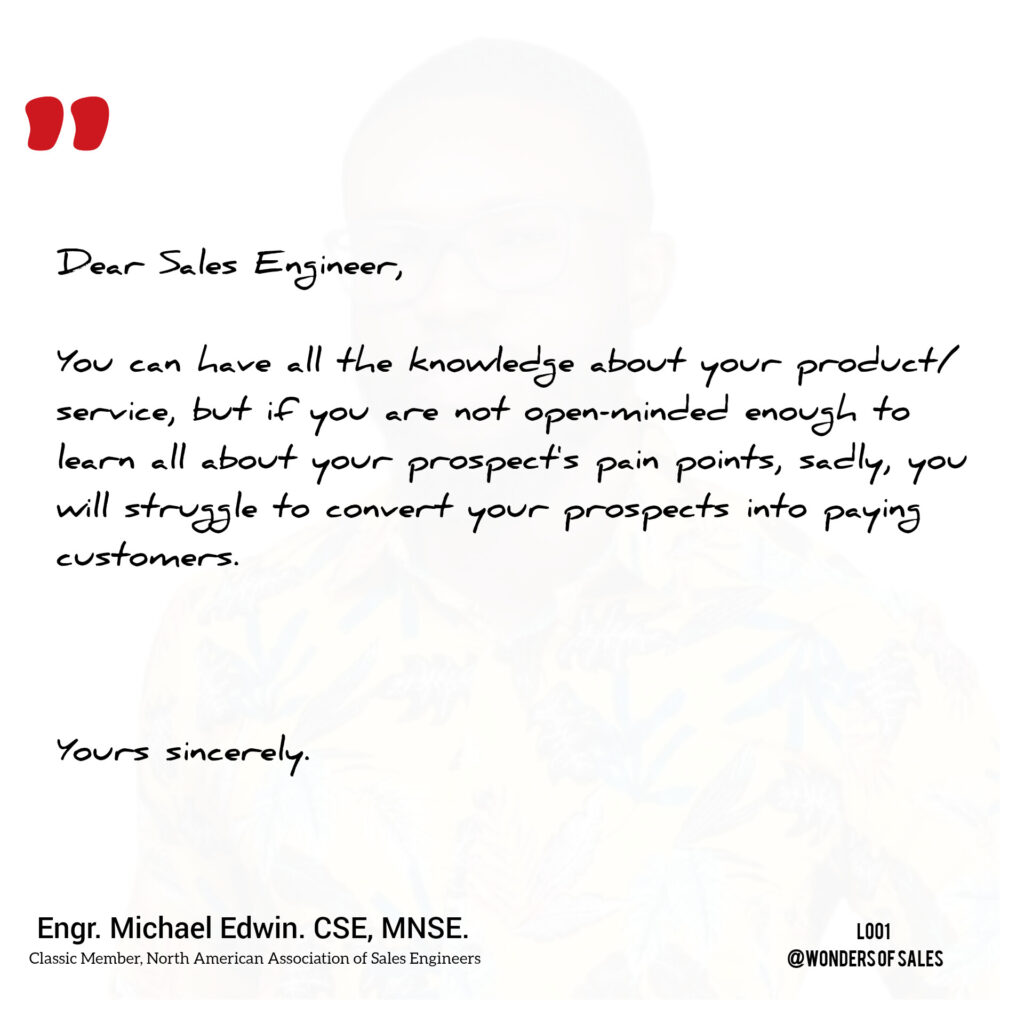
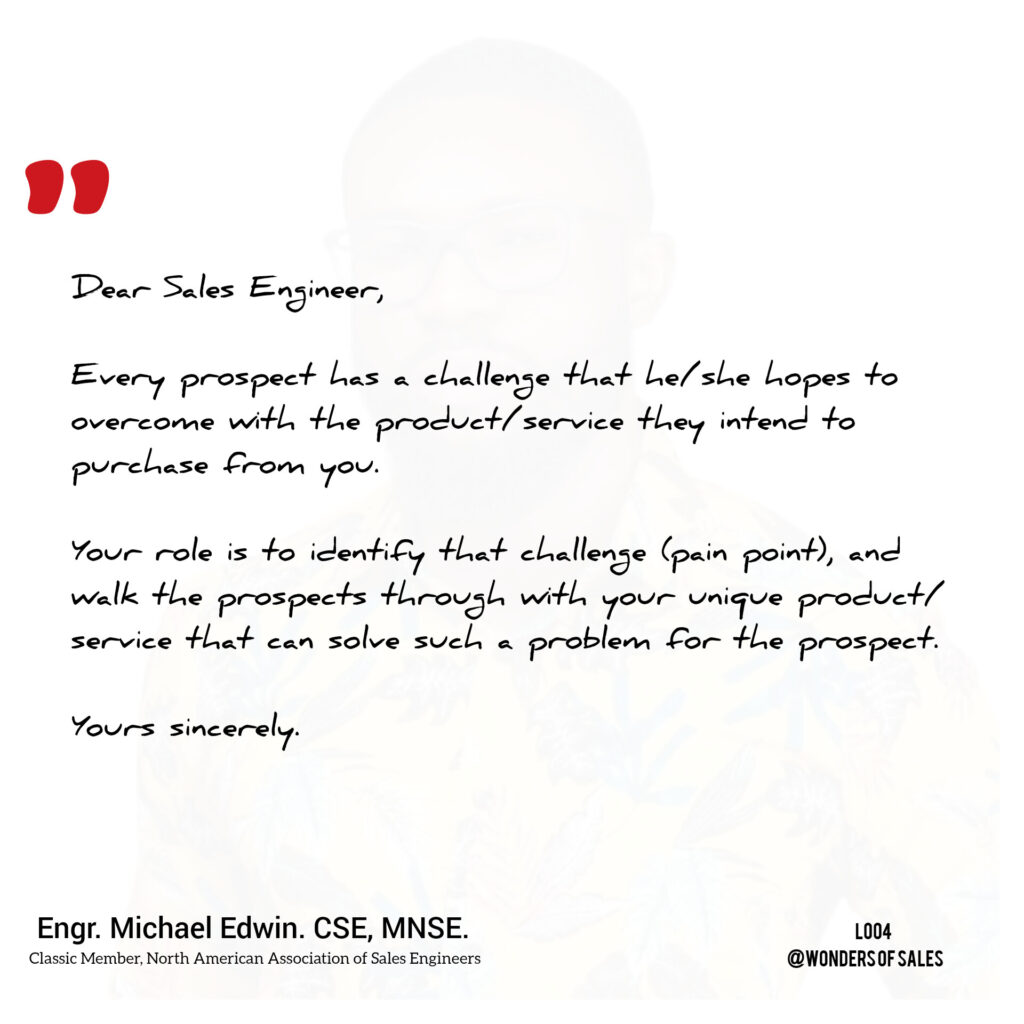
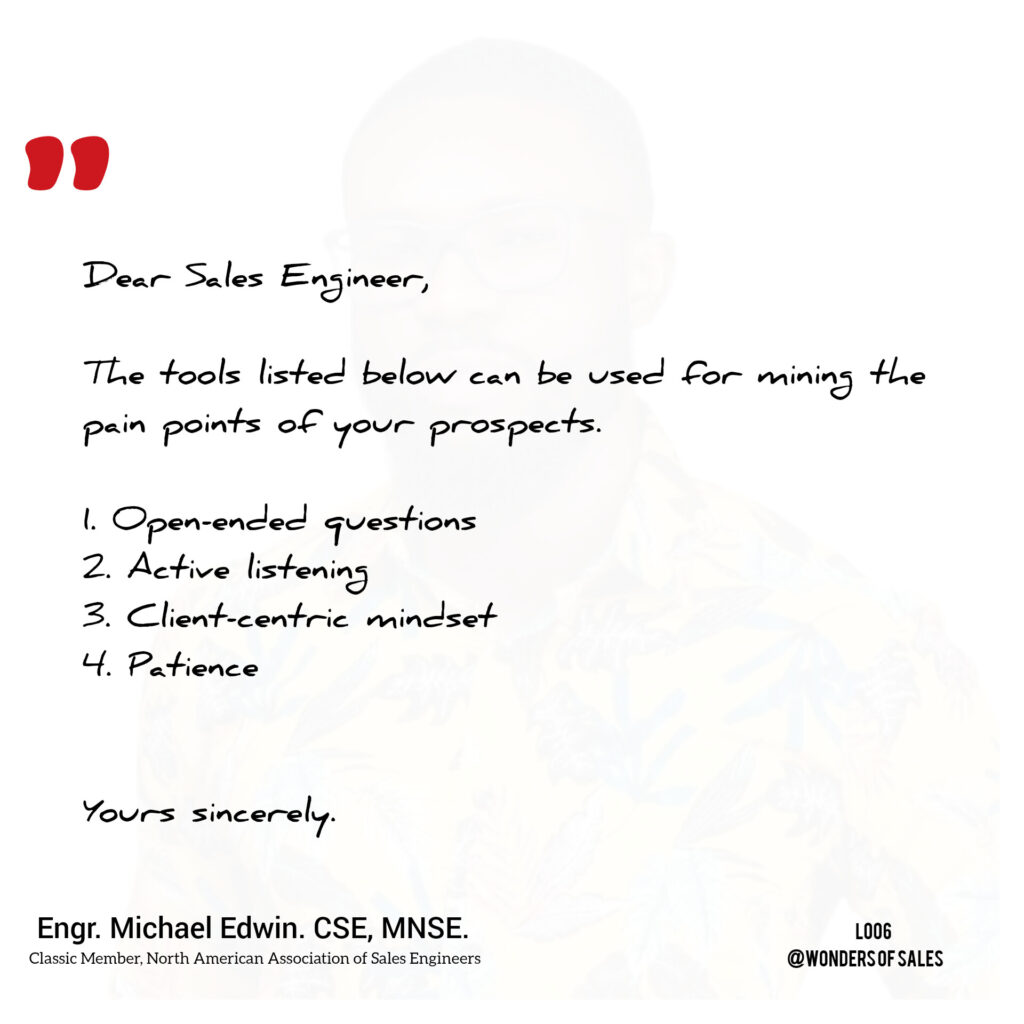
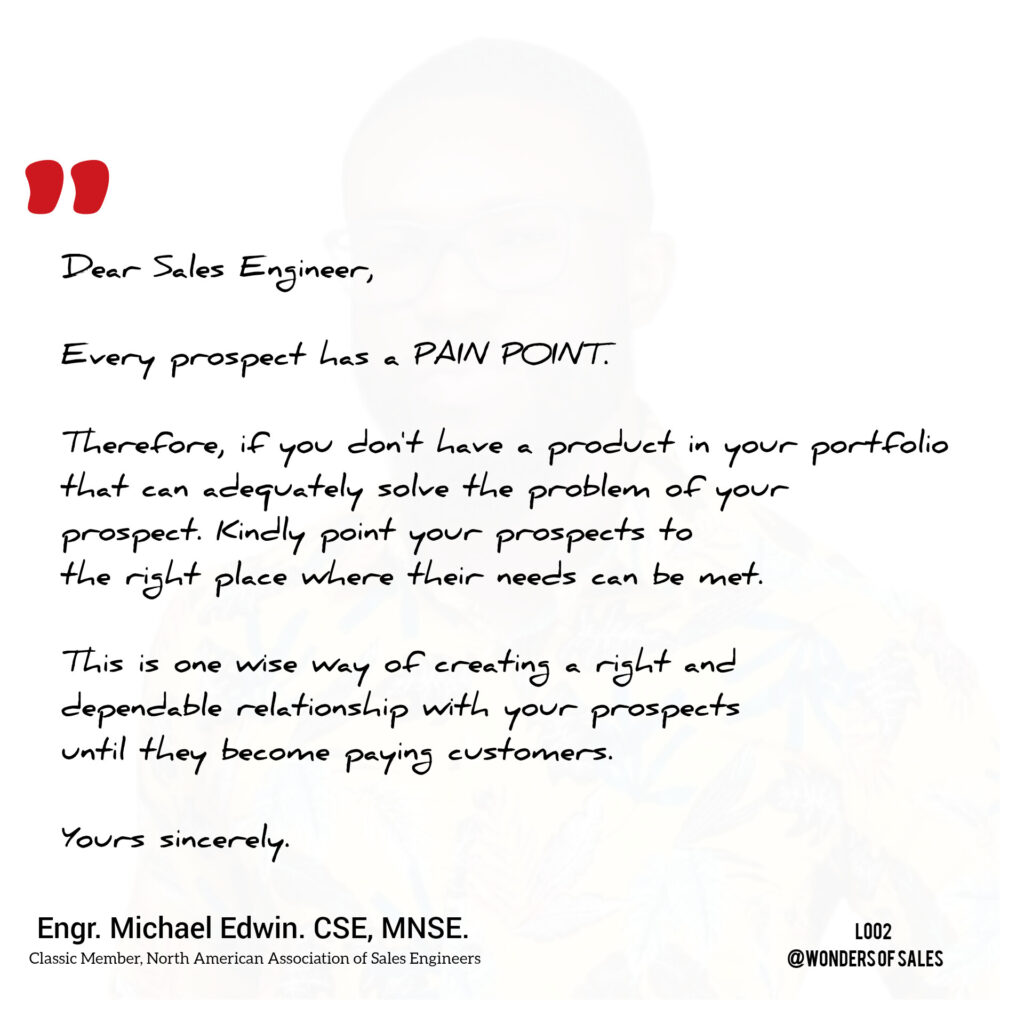
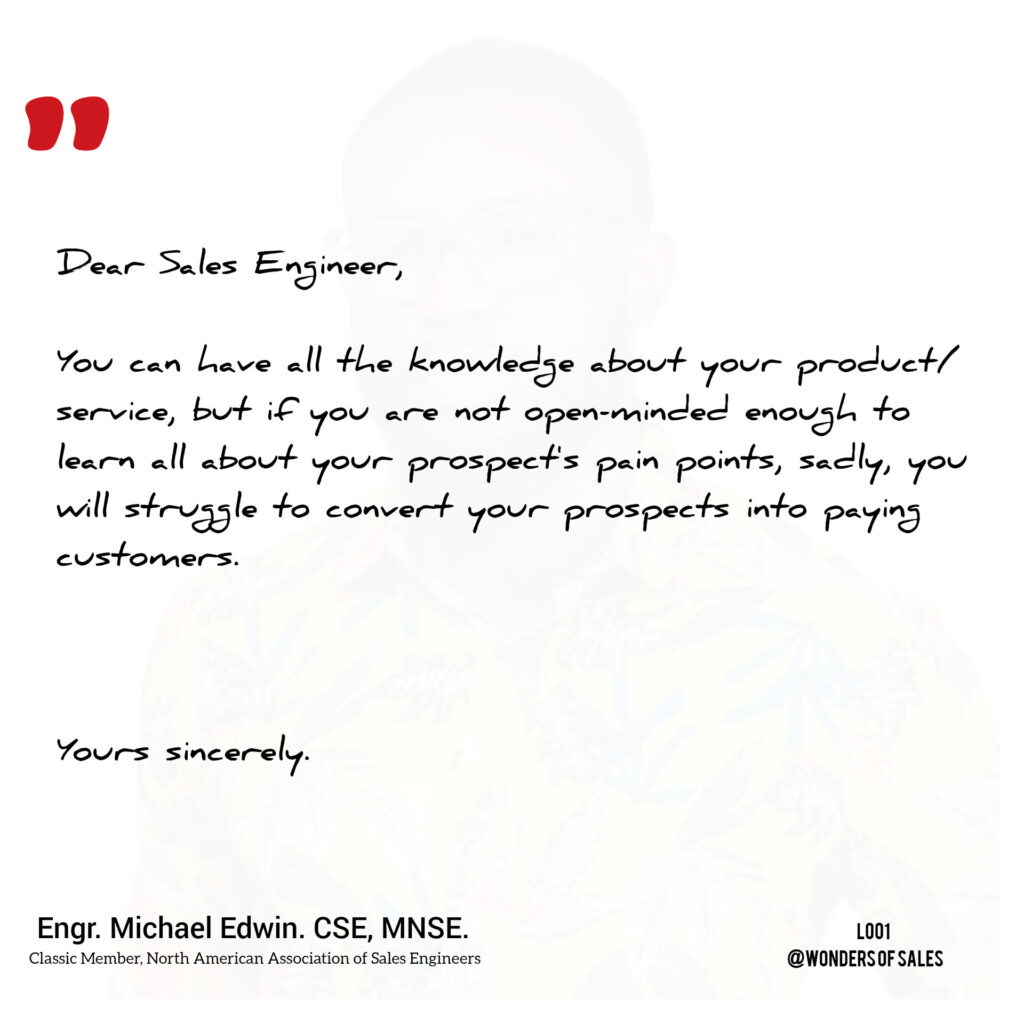
All these letters are written by NAASE member and CSE Michael Edwin.

Welcome to the fast-paced world of real estate, where every deal is a delicate dance of negotiations, market trends, and meeting client expectations. Now, let’s talk about a crucial but often overlooked partnership that’s like the secret sauce in this real estate mix – the tag team of real estate pros and sales engineers. These unsung heroes aren’t just tech-savvy wizards; they’re the key players who bring a unique skill set to the table, making real estate transactions not just smoother but also more tech-tastic. Buckle up as we dive into the ways these sales engineers take real estate to new heights!
First off, let’s demystify the role of these sales engineers. They’re the bridge builders, connecting the technical nitty-gritty of real estate with what clients actually want. Unlike your typical real estate folks, sales engineers have a deep understanding of construction, systems, and all things tech. Their main gig? Making sure the geeky side of properties lines up seamlessly with what clients need, ensuring a hassle-free transaction.
In a world where tech is king, sales engineers bring a high-tech edge to the real estate game. They don’t just stop at the surface-level stuff like location and aesthetics. No sir, they’re the Sherlock Holmes of property, examining HVAC systems, scrutinizing security features, and suggesting tech upgrades – especially for commercial properties. This not only adds extra value to the deal but also turns real estate pros into tech-savvy superheroes with a full grasp of the properties they’re rocking.
Now, let’s talk about customization. Sales engineers are the masters of tailoring solutions to match each client’s real estate dreams. They get that one size does not fit all in this market. So, they team up with real estate pros to understand clients’ needs and goals. Those who are looking to invest for retirement income might have specific needs. For instance, they might lean towards properties that can serve as a legacy asset, providing a valuable inheritance for future generations. Retirees may prioritize building wealth through real estate to leave a financial legacy for their heirs or charitable causes. Real estate pros can work with sales engineers to stand out and offer a service that is crafted according to these preferences.
Communication and decision-making get a turbo boost when real estate pros team up with sales engineers. These tech whizzes don’t just speak in binary code; they’re pros at translating tech jargon into plain English. This skill comes in handy during negotiations, helping real estate agents confidently present the critical details and address client concerns.This is particularly valuable for turnkey real estate investors who often require a thorough understanding of potential investments. Sales engineers play a pivotal role in this process by providing every relevant detail, empowering investors to well-informed decisions and proceed with confidence.
The synergy between real estate pros and sales engineers isn’t just a partnership – it’s a power duo that can skyrocket a real estate business. In a world where technology is shaking things up, sales engineers are becoming the MVPs, guiding us through the twists and turns of real estate investing. It’s not just about selling properties; it’s about crafting tailor-made solutions that dazzle clients. So, as the tech revolution continues to reshape the real estate landscape, remember this dynamic duo. The collaboration between real estate pros and sales engineers isn’t just a game-changer; it’s a powerful force that’s propelling the whole real estate business to new heights. Get ready to ride the tech wave, because these sales engineers are steering us toward a future where real estate meets innovation head-on!
Written by guest writer Austin Page

Sales engineers (and similar titles like “Solutions Consultants”) are often viewed as a trusted advisor, and in many ways work much like a consultant for their client and/or prospect.
That is the way that we (SE’s) should view ourselves, and ideally that is the way that our clients view us, and even our employers should view us. We are essentially business consultants- that work with and partner with a client company to improve their own efficiencies and profits (via of course one of our services/products/offerings).
What is it worth to a firm to brainstorm and work together with you, a technical sales professional, to help them and their department? They are seeking a valid solution- an answer. Often times those solutions can be a bit obtuse and complicated. And that is why they are speaking to you, someone with relevant experience who has also assisted many other (similar) companies.
In this fashion the SE is very much like a 3rd party business consultant. Consultants are called in frequently to really dig into a problem and work to create viable solutions. What does a company pay for a temporary consultant to come in and provide their own analysis and suggestions?
According to Consulting Mavericks, it varies quite a bit. Anywhere from $100/hour to $500/hour. Seems like a good general average is between $200- $300/hour. $200/hour is roughly $400k per year- if it was extrapolated out to full-time.
Are you earning $400k per year? Most likely not. The median compensation for an SE in 2023 was roughly $150k/year – and that can vary greatly.
The point is that the best SE’s out there are considered trusted advisors, or trusted “consultants”, and their clients know the numbers and the value mentioned above. Instead of paying $300/hr they are essentially paying nothing (directly). They likely are paying for a type of software or some other tool or piece of equipment, but the company likely would be paying for that anyhow- at the recommendation of a hired consultant.
This article is not to diminish the worth of a true, 3rd party business consultant. In most of those cases, said consultant is not attempting to sell anything or any product- other than their own acumen and knowledge.
Know your worth out there in the marketplace. The market is your employer and also your clients and prospects. Having this confidence and attitude will actually help you in becoming a better and more savvy sales engineer.

Sales engineers play a crucial role in bridging the gap between technical intricacies and client needs, ensuring a seamless journey from initial interaction to successful product implementation. This article delves into the key strategies and principles that contribute to fostering meaningful and enduring client relationships in the world of sales engineering.
Successful client engagement starts with a deep understanding of the client’s needs. Sales engineers must go beyond surface-level interactions to comprehend the unique challenges and objectives of each client. This requires active listening, asking insightful questions, and demonstrating a genuine interest in the client’s business operations.
Understanding the client’s pain points, goals, and constraints will help sales engineers tailor their approach to offer solutions that align seamlessly with the client’s objectives. This empathetic understanding not only builds trust but also positions the sales engineer as a valuable partner rather than a mere vendor.
Clarity is vital in communication. Sales engineers must convey complex technical information in understandable terms, avoiding jargon. Utilizing clear and concise language, avoiding jargon, and incorporating visual aids can help bridge the communication gap and ensure that clients grasp the value proposition.
Additionally, maintaining open lines of communication throughout the sales process is crucial. Regular updates, transparent discussions about potential challenges, and collaborative problem-solving contribute to a sense of partnership between the sales engineer and the client.
Sales engineers must prioritize protecting organizational and client data through robust systems and processes, such as obtaining a SOC 3 report. This report provides independent assurance that an organization’s controls effectively protect against security risks, contributing to client confidence and overall organizational credibility. Showcasing adherence to such stringent standards not only instills confidence in clients but also contributes to the overall credibility of the organization.
Actions speak louder than words in sales engineering. A well-executed proof of concept (PoC) validates claims and instills confidence in the client while showcasing the practical benefits of the proposed solution. This hands-on approach deepens the connection between the client and the sales engineer, providing concrete evidence of the product’s value.
Sales engineers are responsible for product sales and ensuring clients can use it effectively. Comprehensive training and educational resources empower clients to maximize the value of their investment. This commitment to ongoing support and education builds a foundation for lasting relationships, as clients recognize the added value beyond the initial sale.
Technology is constantly evolving, and client needs are no exception. Sales engineers must stay attuned to industry trends, emerging technologies, and changes in client requirements.
Regular reassessment ensures that proposed solutions align with client goals. This adaptability demonstrates a commitment to staying current in a rapidly changing landscape and positions the sales engineer as a forward-thinking partner invested in the client’s success.
Effective client engagement in sales engineering requires a multifaceted approach that prioritizes understanding client needs and goals. Emphasizing data security through processes like the SOC 3 report is also essential for building trust and ensuring long-term client relationships. Sales engineers who prioritize effective client engagement and data security will stand out as leaders in the field, driving innovation, building resilient partnerships, and fostering a secure digital future.
Thanks to the author of this article Austin Page

Financial literacy is uncommon because the majority of most companies’ employees don’t know how to read Balance Sheets and Income Statements. Why is this? Most instruction about finance pertains to personal concerns such as checking accounts, insurance, mortgages, certificates of deposit, etc. Balance Sheets and Income Statements are excluded because they are much larger and complex topics, most often included in business school curricula.
Unfortunately, the lack of financial skills prevents a company-wide connection with corporate and customer financial goals. That is, shareholder financial objectives can be an abstraction for many department heads and employees. These work associates, talented as they are, don’t understand the exact mechanics of, and risks to, Income Statement profitability or Balance Sheet health. Also, customers can sense that your staff’s skills and activities are not focused on their financial needs and objectives.
Finance Insights, LLC reduces this costly knowledge gap with its 90 minute in person training module that explains financial statement structures and demonstrates how companies achieve profitability by growing and controlling specific line items on their Income Statements. If this type of instruction could be helpful to your organization, a Finance Insights presentation at your next employee gathering or training session will be a worthwhile addition. At the end of the seminar, attendees will be able to:
With Finance Insights, LLC’s 90-minute format, financial statement literacy can be conveniently delivered in a variety of settings ranging from one-off staff meetings to formalized training sessions. Presentation content is effective and interactive while lively and entertaining. For more information, please visit www.financeinsights.us

If you are in B2B within a SE or presales role, it is smart to consider what is happening on the “other side” of the table- the buyer/prospect’s procurement team. This has a significant affect on whether your company will make the sale. What are they looking at? What are they analyzing? Why would they buy a product/ SaaS from you instead of someone else or retain what they already have?
In considering these questions, I read a recent article from Edgeworth Box, titled Good Procurement Practices Massively Lower Costs:
https://www.edgeworthbox.com/good-procurement-practices-massively-lower-costs/
Their article has a few key points: “Internal discussions about procurement tend to focus on cost above all else. The procurement department exists to beat down suppliers and ensure that they get the best price or to enforce policies and procedures intended to curb waste, fraud, and abuse.
An interesting study from researchers at Yale University, Columbia University, and the University of California, Berkeley highlights two key contributing factors to higher costs in procurement: the capacity of the procurement department executing the purchase, and insufficient competition among bidders.”
They claim that a strong procurement team typically spends about 30% less on needed products and services than an average procurement team. In addition, “Understaffing of procurement talent means that states outsource work to expensive third-party consultants. Consultants may not be as motivated to drive an optimal outcome. This is also complicated by poor specification of the project or the need to change the project mid-stream. This is noteworthy given well-documented reductions in procurement workforces.”
There is a lot to consider here.
For one, most procurement departments are understaffed. Too few people doing too much. This is a big reason why B2B purchases and contracts can take FOREVER. But also, they are looking for anything to simplify their jobs and decisions. Thus, try to make it easier for them to select you.
On the Sales side, our job is to differentiate our product/ our software so that the prospect cannot truly compare our product to several competitors. We don’t want it to be all about price. In many cases we may not want there to be an “apples-to-apples” comparison.
However, that is exactly what the procurement team, or their 3rd party consultant, will be doing. They will compare the several considered products or software by features, other factors, and of course upfront and ongoing costs. Generally, the procurement department is not your “champion” at the company. They likely have never met you and there is no personal or direct relationship with you or the Account Executive.
The procurement department wants to select an option between several different bidders/vendors. They don’t want a unicorn. They cannot compare a unicorn to other similar companies. However, many companies pitch their product like it is a unicorn. “You can’t compare us to XYZ Company”, etc. We in Sales can say that, but we will be compared to XYZ Company. That is the reality.
Knowing what the other side values and will do is important in any B2B scenario. Know in detail how your product compares to others that are related or semi-related. And try to make the protocols and provisions easier for the procurement department when applicable.
They have a job to do, as do you. The goal is to align those jobs and outcomes as much as feasible and realistic.